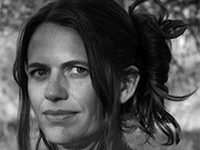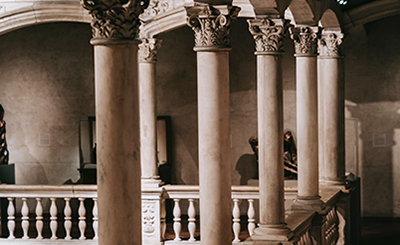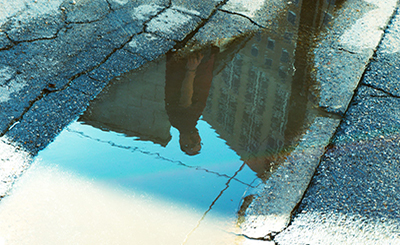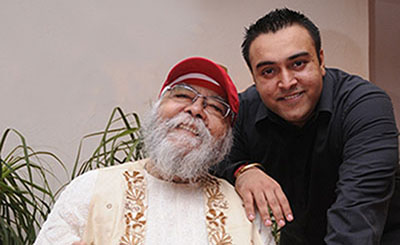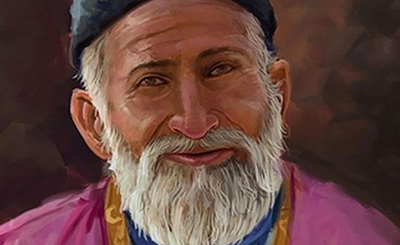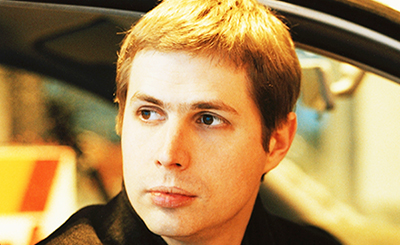
1. From Flat White (20/20)
a compromised translation with, and for, Samira Negrouche
{1}
There are the pages that arrive without your writing them
at the end of the night that an editor won’t expect that
forge a path toward an imaginary book you watch recede
as time goes by you prefer to think of it forever inside the
dead memory of the computer.
{2}
I like to drink coffee with a cloud of fake cream I like
coffee without anything without sugar I only like when
the thick cloud of dawn I confront before sleep when it
slides and collapses the valleys from the hills and in
silence I like this trickle of cream it transports me / from
breast unto nípple / from breast to breast.
{3}
She served me a watery cup in a bowl the color of earth
she said I’ve written a novel but the diskette is broke she
said look at my olive trees I have dreamed of an orchard /
long I walk / down three steps I see weeds in the distance
ablaze in the sun a lemon tree bent in defense like a blind
forward / on the football field / I say it’s handsome your
field / of olives try a new brand of diskette.
2. From What It Means to Be Avant-Garde
(after David Antin)
I feel sad.
I feel discouraged about the future.
I feel I have failed more than the average person.
As I look back on my life, all I can see is a lot of failures.
I don’t get real satisfaction out of anything anymore.
I am dissatisfied or bored with everything.
I feel quite guilty most of the time.
I expect to be punished.
I am disgusted with myself.
I am critical of myself for my weaknesses or mistakes.
I blame myself for everything bad that happens.
I have thoughts of killing myself, but I would not carry them out.
I would like to kill myself.
I would kill myself if I had the chance.
I don’t cry any more than usual.
I used to be able to cry, but now I can’t cry even though I want to.
I am no more irritated by things than I ever was.
I am slightly more irritated now than usual.
I have lost all of my interest in other people.
I make decisions about as well as I ever could.
I can’t make decisions at all anymore.
I am worried that I am looking old or unattractive.
I feel there are permanent changes in my appearance that make me look
unattractive.
3. From What It Means to Be Avant-Garde
I have to push myself very hard to do anything.
I don’t sleep as well as I used to.
I wake up several hours earlier than I used to and cannot get back to sleep.
I get tired from doing almost anything.
My appetite is not as good as it used to be.
My appetite is much worse now.
I have lost more than five pounds.
I have lost more than fifteen pounds.
I am worried about physical problems like aches, pains, upset stomach, or
constipation.
I am very worried about physical problems and it’s hard to think of much else.
I have not noticed any recent change in my interest in sex.
I have lost interest in sex completely.
4. From What It Means to Be Avant-Garde
I was in the park when they called — with my head on my knee and my
nose in a book — the book was by David Antin, an American
— there are many ways to follow a thought — when the
phone rang they told me they wanted me — there was a voice
on the phone that belonged to a man — it sounded like a man
and him saying they wanted me — I read a book the other
day by a circus performer — in my youth I read a book by an
anthropologist’s son — who ran off with the Gypsies with
his parents’ blessing — the anthropologist’s son was not an
American — the circus performer was unstable emotionally
— she committed suicide at the age of forty-two — the man
said we want you to come in for some tests — the parents
hoped the boy would grow up to write a book — in which
he’d detail the functioning of Romani culture — before the
phone rang I was reading the bit in the Antin — about how
it’s a good thing to be on the fringe — the boy learned the
Gypsies don’t lie to their own — coterie makes you soft —
when I went in for the tests they said I was normal — and
only after I did a lot of research on the Internet — did I come to
understand what they meant by that — was that my condition
is unexplained
5. From What It Means to Be Avant-Garde
I feel downhearted and blue Most of the time.
Morning is when I feel the best Some of the time.
I have crying spells or feel like it Good part of the time.
I have trouble sleeping at night A little of the time.
I eat as much as I used to Good part of the time.
I still enjoy sex A little of the time.
I notice that I am losing weight Some of the time.
I have trouble with constipation A little of the time
My heart beats faster than usual Some of the time.
I get tired for no reason Good part of the time.
My mind is as clear as it used to be A little of the time.
I find it easy to do the things I used to Some of the time.
I am restless and can’t keep still Most of the time.
I feel hopeful about the future A little of the time.
I am more irritable than usual Most of the time.
I find it easy to make decisions [ ]
I feel that I am useful and needed Some of the time.
My life is pretty full A little of the time.
I feel that others would be better off if I were dead Most of the time.
I still enjoy the things I used to do [ ]
6. From What It Means to Be Avant-Garde
I had forgotten the name of the anthropologist’s son — it was mid-
morning and I was sitting at my desk — taking the last sip
of my morning decaf with soy — the last sip is always cold
and unsatisfying — this was not my first attempt to recover
the boy’s name — I had of course forgotten the book’s title as
well — I typed Dutch Gypsy narrative young anthropologist
into my machine — for fifteen years I’ve been trying to
recall the name of the boy or of the book — I may even have
unsuccessfully searched for them before — during those years
I recreated a memory of the narrative — he is beloved by the
group and accepted as one of them — he does not miss his
parents though he holds them in high esteem — he learns to
sing from a dark-haired man and to steal from a dark-haired
girl — the boy himself is as blond as a broom — the feeling
of not knowing is like flying in your dreams — around the
time I started searching I stopped dreaming anything fun —
Dutch Gypsy narrative young anthropologist did the trick
— his name came up and I remembered it — recognition
makes you fall but you can try to resist — though you’ll make
yourself ridiculous flapping all around — I switched windows
and searched for my unexplained condition — there are lots
of people who have it and none of them can spell — it turns
out I was wrong about my search being successful — the
name I thought I recognized was of a different person — an
eighteenth-century abolitionist who fell in love with a slave —
he slept with many others but only fell in love once — I did
another search and this time left out nationality — I typed son
of anthropologists adopted by Gypsies — when mysteries
are explained they don’t exactly disappear — the boy was
Belgian not Dutch and that had been my mistake — the man
called back to say one of my test results was compromised —
the title of the book is The Gypsies
7. From What It Means to Be Avant-Garde
The Gypsies was republished in 1987 — a time that still can be called
my youth — I was living in Los Angeles waiting for high school
to end — my condition would not manifest for another twenty
years — in the talk where David Antin discusses life on the
fringe — he is in Los Angeles at an art space called LACE —
I don’t know what year it was but I could have been there —
growing up in a metropolis can make you soft — I’ve been
going to the same art institutions most of my life — you have
the sense you should be heading inevitably for the center —
when people ask me where I live I say the middle of nowhere
— under certain circumstances it requires effort to stay on
the fringe — what we’re told about Gypsies is they make no
home — in 1957 David Antin was living in Manhattan — in
an apartment that cost him $18.50 a month — when I moved
to Manhattan it was 1993 — the same year Antin’s talk on the
fringe would be published — I paid $400 a month to live in
the East Village — I fell in love with a cook at the rest-
aurant where I waitressed — he carried a knife on the subway
because his city was dangerous — he made me feel totally
irrevocably Californian — the blizzard that winter was record
breaking — we spent our nights at the restaurant and our
days in the darkroom — we woke in strangers’ apartments on
Avenue D — we buried two friends in a matter of months —
sometimes an image moves to the center of a life — his
mother and stepfather were trained anthropologists — look-
ing now at the pictures I can see we were happy — when we
broke up he asked if I was leaving him for art — eventually
he became an editor at Rolling Stone — we had a drink at a
bar and I explained my condition — he gave me many books
during our four years together — one of them was The Gypsies
Excerpts from “Flat White (20/20)” and “What It Means to Be Avant-Garde” are reprinted by permission from They and We Will Get Into Trouble for This (Coffee House Press, 2016). Copyright © 2016 by Anna Moschovakis
More from The Byword
Comments
*Comments will be moderated



